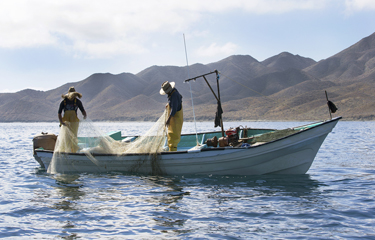In Mexico, gains from fishery management reforms could surpass losses from climate change

Abalone along the Pacific coast in northern Mexico have declined dramatically in the last decade because of lower oxygen levels prompted by climate change. But despite that, the Pacific Federation of Fishing Cooperatives (Fedecoop) has been able to prevent overfishing by limiting the total catch, according to Laura Rodriguez, the associate vice president of the Environmental Defense Fund's Latin and South American Oceans Program.
It's the type of proactive governance that Mexico and Latin America need more of as climate change grows more severe, warping ocean conditions from temperature to acidity, salinity to oxygen levels, all while altering the life histories, distribution, and productivity of marine species, according to Rodriguez.
"If we want to see more success stories like Fedecoop in Mexico and Latin America, we must continue promoting participatory decision-making processes and co-management in fisheries, using the most robust scientific data available," Rodriguez told SeafoodSource, suggesting fishery management councils in which managers, fishermen, scientists, and other stakeholders discuss challenges and solutions.
A recent study published in PLOS ONE, co-authored by Rodriguez, forecasted the effects of climate change on Mexico's fisheries. The study examined 25 of Mexico's most valuable fisheries, accounting for 70 percent of the national catch, and found that 84 percent of those fisheries will be impacted by climate change.
The greatest declines in productivity are projected in the Gulf of California and the Mexican Pacific, with the greatest declines in catches striking key species such as abalone, red snapper, mahi, jumbo squid, snook, and Pacific sardine, the largest stock in study. Only four stocks were projected to see increases in productivity because of climate change, but range shifts were expected to decrease maximum catch potential for three of those stocks.
In Mexico, more than 350,000 fishers and their families depend on fishing for their livelihood, and the country is a globally significant fishing country – ranked sixteenth in global marine capture production in 2016, landing a total of 1.31 million metric tons – but there is limited information on current fisheries status and laws to aid with fishery adaptation are lacking. The majority of the 735 species in 83 fisheries are unassessed or assessments are not publicly available, the study noted.
But better fisheries management could mitigate some of those negative impacts. In fact, the projected benefits from improved fisheries management far surpassed the losses projected due to climate change, according to the study.
"Although climate change would impact most fisheries evaluated – 84 percent – all of them could benefit from an optimal management strategy and stronger governance to stabilize catches, increase profits, and protect marine life," Rodriguez said.
Photo courtesy of Shutterstock






Share